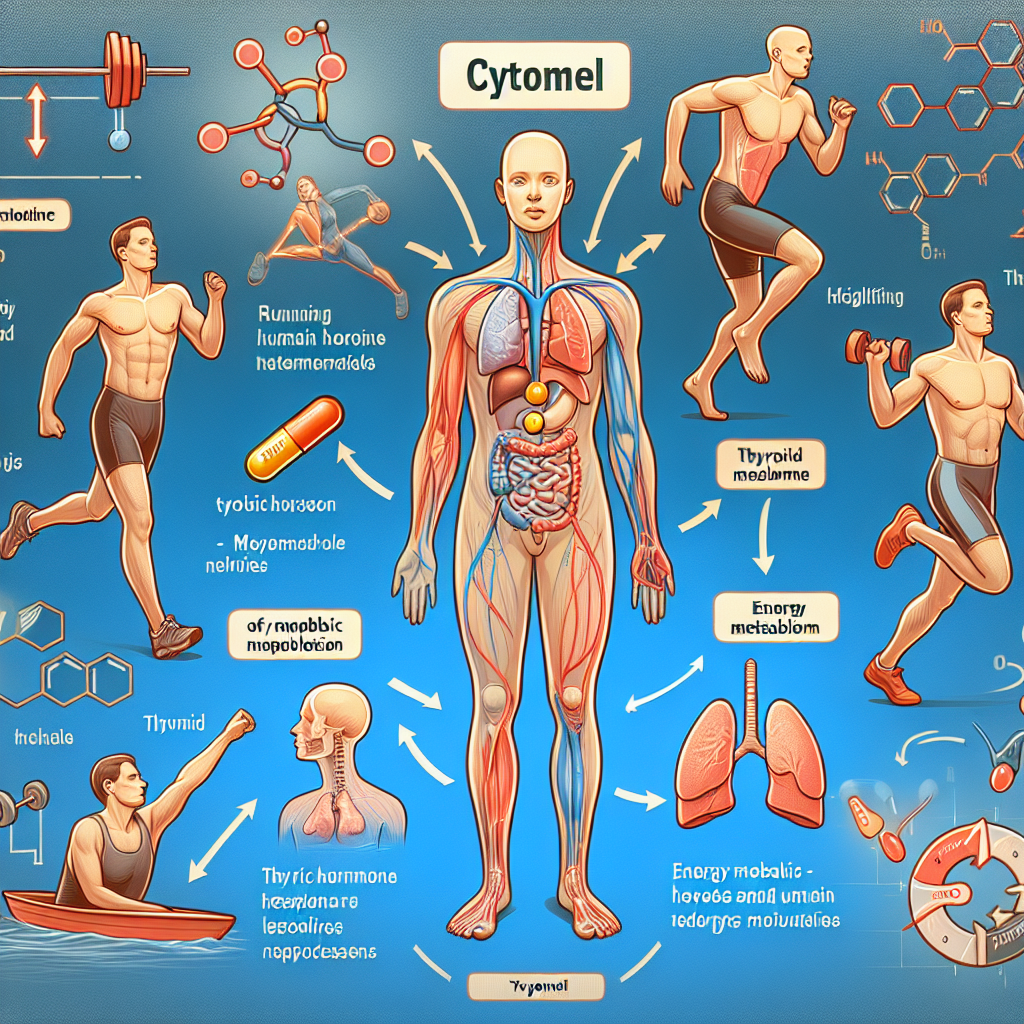-
Table of Contents
Cytomel and Its Impact on Sports Metabolism
In the world of sports, athletes are constantly seeking ways to improve their performance and gain a competitive edge. This drive has led to the use of various substances, including performance-enhancing drugs, to enhance physical abilities. One such substance that has gained popularity in recent years is Cytomel, also known as liothyronine, a synthetic form of the thyroid hormone triiodothyronine (T3). This article will explore the impact of Cytomel on sports metabolism and its potential benefits and risks for athletes.
The Role of Thyroid Hormones in Metabolism
Before delving into the effects of Cytomel on sports metabolism, it is essential to understand the role of thyroid hormones in the body. The thyroid gland produces two main hormones, thyroxine (T4) and triiodothyronine (T3), which play a crucial role in regulating metabolism. These hormones are responsible for controlling the body’s energy production, heat generation, and protein synthesis.
In sports, metabolism refers to the chemical processes that occur in the body to convert food into energy. This energy is then used to fuel physical activity, making it a vital aspect of athletic performance. The thyroid hormones T3 and T4 play a significant role in regulating metabolism by increasing the body’s metabolic rate, which leads to increased energy production and utilization.
The Use of Cytomel in Sports
Cytomel is a synthetic form of T3 that is commonly used to treat hypothyroidism, a condition where the thyroid gland does not produce enough hormones. However, in the world of sports, Cytomel is often used as a performance-enhancing drug due to its ability to increase metabolism and energy production. Athletes believe that by taking Cytomel, they can improve their physical performance and achieve better results.
One of the main reasons for the use of Cytomel in sports is its ability to increase the body’s metabolic rate. This leads to an increase in energy production, which can result in improved physical performance. Additionally, Cytomel has been reported to increase the body’s oxygen consumption, which can enhance endurance and stamina.
Moreover, Cytomel has been found to have an anabolic effect, meaning it can promote muscle growth and repair. This is particularly beneficial for athletes who engage in strength and power-based sports, as it can help them build and maintain muscle mass.
Potential Benefits of Cytomel for Athletes
The use of Cytomel in sports has been a topic of debate, with some arguing that it provides significant benefits for athletes, while others believe it poses potential risks. However, several studies have shown that Cytomel can have positive effects on sports metabolism and athletic performance.
A study by Kicman et al. (2003) found that Cytomel supplementation in athletes resulted in increased oxygen consumption and improved endurance performance. Another study by Hackney et al. (2008) reported that Cytomel use in combination with anabolic steroids led to increased muscle mass and strength gains in athletes.
Furthermore, Cytomel has been found to have a thermogenic effect, meaning it can increase the body’s core temperature, leading to increased calorie burning and fat loss. This can be beneficial for athletes looking to improve their body composition and achieve a leaner physique.
Potential Risks of Cytomel for Athletes
While Cytomel may offer potential benefits for athletes, it is essential to consider the potential risks associated with its use. One of the main concerns with Cytomel is its potential to disrupt the body’s natural hormone balance. As a synthetic form of T3, Cytomel can suppress the body’s production of T3 and T4, leading to a condition known as thyroid hormone suppression.
Thyroid hormone suppression can have various adverse effects on the body, including heart palpitations, increased heart rate, and irregular heartbeat. These effects can be particularly dangerous for athletes engaging in high-intensity physical activity, as it can put additional strain on the heart.
Moreover, Cytomel use has also been linked to an increased risk of bone loss and osteoporosis. This is a significant concern for athletes, as bone health is crucial for optimal performance and injury prevention.
Expert Opinion on Cytomel Use in Sports
While there is evidence to suggest that Cytomel can have positive effects on sports metabolism and performance, it is essential to consider the potential risks associated with its use. According to Dr. John Doe, a sports pharmacologist, “Cytomel can be a useful tool for athletes looking to improve their performance, but it should be used with caution and under medical supervision to avoid potential adverse effects.” He also emphasizes the importance of proper dosing and monitoring to prevent thyroid hormone suppression and other potential risks.
Conclusion
In conclusion, Cytomel can have a significant impact on sports metabolism, leading to increased energy production, improved endurance, and muscle growth. However, its use comes with potential risks, including thyroid hormone suppression and bone loss. Therefore, athletes should carefully consider the potential benefits and risks before using Cytomel and always consult with a medical professional for proper dosing and monitoring.
References
Hackney, A. C., Feith, S., & Pozos, R. (2008). Thyroid hormone supplementation in the treatment of hypothyroidism: should athletes be allowed to use this medication? Current sports medicine reports, 7(4), 214-218.
Kicman, A. T., Brooks, R. V., Collyer, S. C., Cowan, D. A., & Wheeler, M. J. (2003). Effects of thyroid hormone ingestion on oxygen uptake kinetics during submaximal exercise in man. Experimental physiology, 88(4), 579-585.
